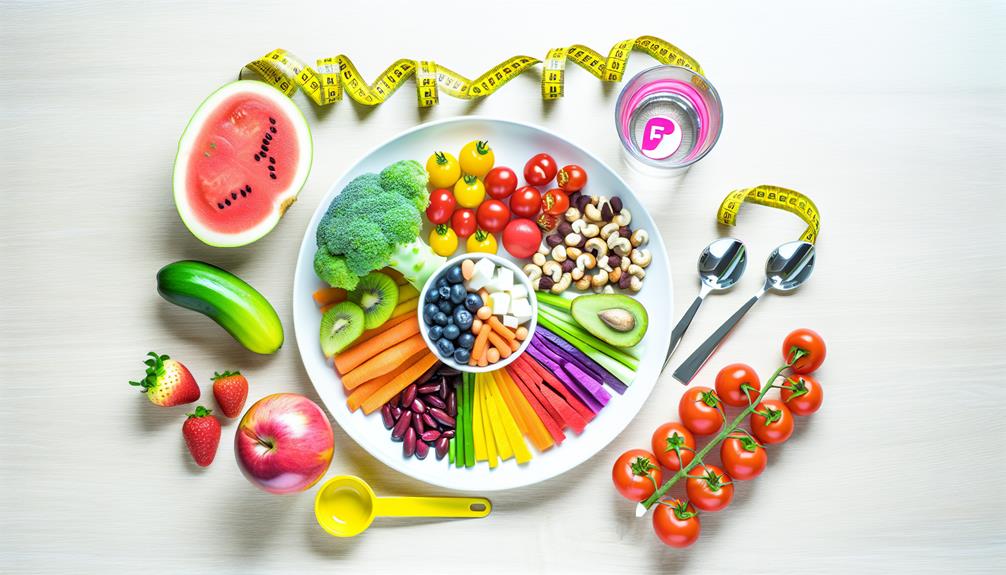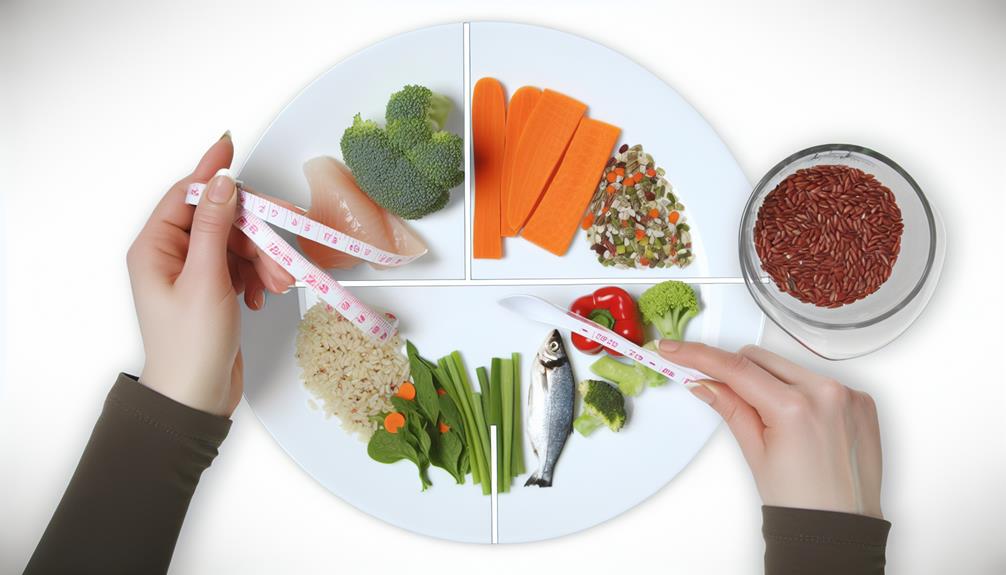Are you aware that the average portion size of a meal has increased drastically over the past few decades, contributing to the rise in obesity rates? With the prevalence of large portion sizes, it's easy to consume more calories than your body needs, leading to weight gain and potential health issues. If you're looking for a practical and sustainable approach to managing your portions and making healthier food choices, Lean Bliss offers a comprehensive guide to help you navigate the world of portion control. Whether you're aiming to shed a few pounds or simply adopt a more balanced approach to eating, this guide provides valuable insights and strategies to support your journey towards optimal health and well-being.
The Importance of Portion Control
You can't underestimate the importance of portion control in maintaining a healthy lifestyle and managing your weight effectively. Portion control plays a crucial role in helping you make healthy choices and maintain a balanced diet. By being mindful of portion sizes, you can prevent overeating and ensure that you are consuming the right amount of nutrients your body needs. It also helps in promoting better digestion and increasing awareness of your food intake.
Practicing portion control can become a habit over time, leading to maintaining a healthy weight and reducing the risk of obesity-related diseases. When you pay attention to portion sizes, you are more likely to make healthier food choices, incorporating a variety of food groups into your meals for a well-rounded, balanced diet. This also ensures that you are consuming enough nutrients to fuel your workouts and daily activities.
Incorporating portion control into your lifestyle not only helps in weight management but also promotes overall well-being. It allows you to enjoy your favorite foods in moderation while still maintaining a healthy diet. By being mindful of portion sizes, you can find a sustainable way to nourish your body and achieve your health and fitness goals.
Understanding Nutritional Needs
You need to understand your nutritional needs to ensure you're getting the right balance of essential nutrients in your diet. This involves knowing what your body requires in terms of carbohydrates, proteins, healthy fats, vitamins, and minerals. It's important to create a meal plan that caters to your individual needs and supports your overall health.
Essential Nutrients
Understanding your body's essential nutritional needs is crucial for maintaining optimal health and well-being. To ensure you consume the right balance of essential nutrients, it's important to pay attention to portion size and serving sizes. When it comes to healthy fats, they play a vital role in the body, aiding in nutrient absorption and supporting cell growth. Here are some important points to consider:
- Portion Size: Being mindful of portion sizes helps you control your calorie intake and ensures you get the right amount of nutrients.
- Stick to recommended serving sizes for different food groups to maintain a balanced diet.
- Healthy Fats: Including sources of healthy fats, such as avocados, nuts, and olive oil, in your diet is essential for supporting overall health and well-being.
Balanced Meal Plans
When creating balanced meal plans, it is essential to consider the varied nutritional needs of individuals, including the proper proportions of proteins, carbohydrates, healthy fats, vitamins, and minerals. Tailoring portion sizes in a meal plan is crucial to meet individual nutritional requirements. It's important to align portion sizes with your activity level and metabolism. By understanding your eating habits, you can make informed decisions about the portion sizes of different food groups. A balanced meal plan should include a variety of fruits and vegetables to ensure an adequate intake of essential vitamins, minerals, and dietary fiber. Incorporating these elements into your meal planning can help provide the energy and nutrients needed for optimal health and well-being.
Practical Tips for Portion Control

To effectively manage portion control, consider using smaller dinnerware to prevent overeating. Research has shown that using smaller plates and bowls can help you consume fewer calories without feeling deprived. By reducing the size of your dinnerware, you can naturally portion your meals and prevent overeating, which is beneficial for weight loss and overall health.
When it comes to estimating portion sizes, your hand can be a useful guide. Use your palm to measure protein, your fist for carbohydrates, your cupped hand for vegetables, and your thumb for healthy fats. This simple method can help you visualize appropriate portion sizes and maintain a balanced meal.
In addition, practicing mindful eating can significantly contribute to portion control. Eat slowly and pay attention to the flavors and textures of your food. By removing distractions and focusing on your meal, you can better recognize feelings of fullness and avoid overeating, supporting your weight loss goals.
Another practical tip is to start your meals with a glass of water. Sometimes, thirst can be mistaken for hunger, leading to overeating. Drinking water before your meal can help curb false hunger, allowing you to better manage your portion control.
Furthermore, serving yourself on a plate, rather than eating straight from containers or serving dishes, can help you keep track of portion sizes and ensure a balanced meal. These simple adjustments can make a significant difference in your portion control and overall eating habits, especially when combined with cooking at home.
Making Balanced Food Choices
Consider incorporating a variety of nutrient-dense foods to make balanced food choices that support your overall health and well-being. When it comes to making balanced food choices, it's essential to focus on whole foods rather than processed foods. Whole foods such as fruits, vegetables, lean proteins, whole grains, and healthy fats provide essential nutrients and are generally lower in calories and added sugars compared to processed foods. By prioritizing whole foods, you can optimize your nutrient intake and support your overall health.
Incorporating portion control into your balanced food choices is also crucial. Understanding correct portion sizes and being mindful of the amount of food you consume can help prevent overeating and support weight management. When choosing whole foods, pay attention to portion sizes to ensure you're not overconsuming even healthy options. For example, while nuts are a nutritious snack, they are calorie-dense, so being mindful of portion sizes is important.
In addition to whole foods and portion control, it's important to consider the balance of nutrients in your meals. Aim to include a variety of food groups in each meal to ensure you're getting a mix of essential nutrients. This could mean incorporating lean protein, healthy fats, complex carbohydrates, and a variety of fruits and vegetables to create balanced and satisfying meals. By making balanced food choices that prioritize whole foods, portion control, and nutrient balance, you can support your overall health and well-being.
Benefits of Lean Bliss Program

You're about to discover the program's effectiveness in promoting healthy eating habits. With Lean Bliss, you'll experience a positive impact on your overall well-being, as it helps you maintain a balanced lifestyle. Get ready to reap the benefits of portion control and improved energy levels.
Program Effectiveness
Enhancing overall well-being and self-confidence, the Lean Bliss Program promotes weight management through effective portion control. This approach not only aids in weight loss but also reduces the risk of obesity-related diseases by emphasizing portion control. By focusing on portion control, the program encourages a healthier relationship with food, leading to improved energy levels throughout the day. The effectiveness of the Lean Bliss Program lies in its ability to steer individuals away from eating processed food and towards balanced eating habits. This shift not only supports weight loss goals but also enhances overall well-being and self-confidence, making it a comprehensive program for those looking to improve their health and maintain a healthy weight.
Healthy Eating Habits
When following the Lean Bliss Program, you can experience the benefits of adopting healthy eating habits, including improved portion control and better food choices. By understanding portion control and the bliss point of food, you can train your body to enjoy smaller, satisfying portions. This habit promotes mindful eating and prevents overconsumption, leading to weight management and improved digestion. Additionally, practicing portion control increases your awareness of food intake, reducing the risk of obesity-related diseases. It also ensures that you consume enough nutrients to fuel your workouts, supporting overall health and wellness. Embracing healthy eating habits through portion control not only helps you maintain a healthy weight but also fosters a positive relationship with food, empowering you to make nourishing choices for your body.
Strategies for Satisfying Meals
To create satisfying meals, it's important to plan balanced and nutrient-rich dishes that provide both satisfaction and energy. The next step is to make healthy choices and incorporate a variety of colorful fruits and vegetables into your meals. Not only do they make your meals visually appealing, but they also provide essential vitamins, minerals, and fiber. Experiment with different cooking methods and flavor combinations to keep your meals interesting and enjoyable. This can help prevent mealtime boredom and increase overall satisfaction with your meals.
When it comes to portion control, using smaller plates and bowls can naturally control portion sizes and prevent overeating. This simple strategy encourages you to serve yourself smaller portions, helping you to maintain a healthy balance and avoid consuming more than your body needs. Additionally, listening to your body's hunger and fullness cues is crucial for determining when to start and stop eating. This mindful approach to eating promotes a healthy relationship with food and prevents overeating.
Portion Control for Weight Management

As you shift your focus to 'Portion Control for Weight Management', mastering the art of portion sizing is crucial for achieving and maintaining a healthy weight. Portion control plays a significant role in managing your weight by preventing overeating and helping you make healthier food choices. Understanding portion sizes allows you to enjoy a variety of foods while keeping your calorie intake in check. Using smaller dinnerware, estimating portion sizes using your hand, and measuring food portions can aid in portion control. These strategies can help you avoid the temptation to overeat and promote healthier eating habits.
Additionally, practicing mindful eating and avoiding distractions during meals can contribute to successful portion control. By focusing on the sensory experience of eating, you can tune in to your body's hunger and fullness cues, which can prevent overeating. Embracing a healthy mindset around food and portion control is also essential. Instead of viewing portion control as restrictive, consider it a way to nourish your body and cultivate a positive relationship with food.
Incorporating Lean Bliss Into Lifestyle
Embracing Lean Bliss into your lifestyle involves emphasizing portion control as a key component of maintaining a healthy and balanced approach to eating. By incorporating Lean Bliss into your daily routine, you can significantly improve your overall well-being and relationship with food. Here are some key points to consider when integrating Lean Bliss into your lifestyle:
- Mindful Eating: Practicing mindful eating is essential for portion control and good health. It involves being present in the moment while enjoying your meals, savoring each bite, and recognizing when you are full. This approach allows you to appreciate the flavors and textures of your food while preventing overeating.
- *Incorporate Olive Oil*: Using olive oil in your cooking can be beneficial for portion control and overall health. It provides healthy fats and can help you feel satisfied with smaller portions. Additionally, using olive oil in moderation can contribute to a balanced diet and improved well-being.
Incorporating Lean Bliss into your lifestyle requires a shift in mindset towards food and eating habits. It's not just about what you eat, but also about how much you eat and the way you approach meals. By focusing on portion control, practicing mindful eating, and making healthier food choices, you can cultivate a positive relationship with food, leading to a happier and healthier lifestyle.
Long-Term Success With Lean Bliss

Consistently practicing portion control is essential for achieving long-term success with Lean Bliss, fostering sustainable and lasting results in maintaining a healthy weight. By incorporating portion control into your daily routine, you can establish habits that contribute to your long-term success in achieving and maintaining a lean and healthy body. Long-term success with Lean Bliss involves making portion control a natural and effortless part of your everyday eating habits. Over time, developing portion control habits can lead to sustainable and lasting results, ensuring that you achieve and maintain a balanced and healthy lifestyle.
In addition to physical benefits, mastering portion control also has a significant impact on your mental health. By understanding and implementing portion control, you can experience a sense of empowerment and control over your eating habits, which can positively influence your overall well-being. Feeling confident in your ability to manage portion sizes can alleviate stress and anxiety related to food consumption, contributing to a healthier mindset and relationship with food.
Ultimately, embracing portion control as a fundamental aspect of Lean Bliss is key to achieving long-term success. It not only supports your physical health by aiding in weight management but also nurtures your mental well-being by providing a sense of control and empowerment. By prioritizing portion control, you can lay a strong foundation for sustained, positive lifestyle changes that contribute to your overall health and happiness.
Frequently Asked Questions
What Are 5 Methods of Portion Control?
Hey, did you know that using smaller dinnerware is a visual cue to control your portions? Practicing mindful eating, like estimating portion sizes using your hand, is crucial. Also, plate size matters. Starting meals with a glass of water can curb false hunger, and serving yourself on a plate can help keep track of portion sizes and variety. These methods can help you control your portions and eat right.
What Portion Control Should I Eat?
You should eat portion-controlled meals to maintain healthy habits and promote mindful eating. This ensures you consume the right amount of nutrients without overeating, supporting your overall well-being. By understanding your body's hunger cues and serving yourself appropriate portion sizes, you can develop a balanced and sustainable approach to eating. Embracing portion control as a routine practice can help you make healthier food choices and prevent overindulgence, contributing to your overall health and fitness goals.
Can You Lose Weight Just by Portion Control?
You can definitely lose weight just by portion control. Mindful eating and paying attention to your hunger cues are key. Emotional eating can throw you off track, so it's important to be mindful of your emotions and how they influence your eating habits. By focusing on portion control and being aware of your body's signals, you can achieve your weight loss goals in a healthy and sustainable way.
What Is the 20-Minute Rule for Eating?
You can use the 20-minute rule to practice mindful eating. It involves taking at least 20 minutes to finish a meal. This helps you become more aware of your hunger cues and prevents overeating. Eating slowly for 20 minutes allows your brain to register fullness and satisfaction, promoting better digestion and absorption of nutrients. By following this rule, you can enjoy your meals more and become more in tune with your body's signals.
